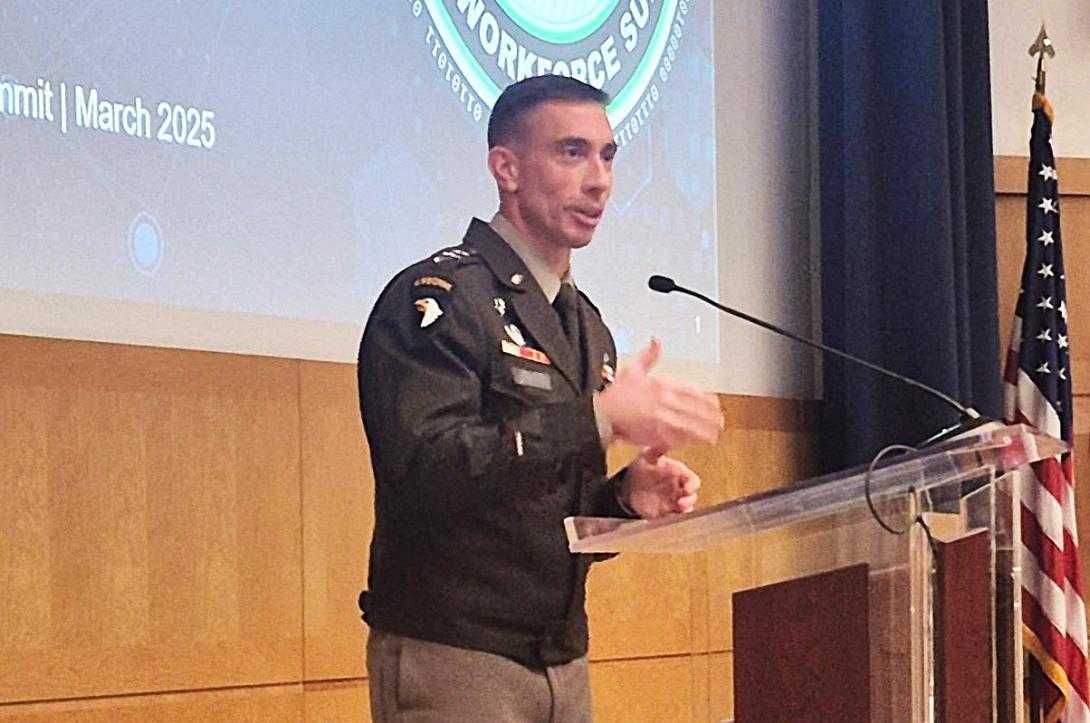Stanton Gives a Call to Action for the Future of Cybersecurity
The 2025 DoD Cyber Workforce Summit kicked off on March 20 with a call to action that included the need for technical competence, lifelong learning and a warrior ethos in the cybersecurity workforce.
“Our talent is our asymmetric advantage,” said Lt. Gen. Paul Stanton, USA, director of the Defense Information Systems Agency (DISA), in his opening remarks. “What we have is talent and free thought. Let’s put those together so that we fight and win.”
Stanton emphasized the importance of technical aptitude on the first day of the summit at the National Defense University at Fort McNair in Washington, D.C.
“Shame on every commander and leader that doesn't understand how data flows on the battlefield. The days of ignoring cyber as a warfighting domain are gone. Everything. Everything is a data producer and data consumer.”
Technical aptitude not only earns you the respect of your formation, he explained, but it also offers you the trust to execute within the “left and right limits and bounds.” His answer to what a cyber professional needs to know to be effective in the cyber warfighting domain is the same as it was when he was asked on a panel a decade ago: “You’ve got to understand operating systems, you’ve got to know how to write code, and you’ve got to understand networks.”
Stanton also emphasized the need for lifelong learners in his call to action. “The world is moving around us. You have to have a voracious appetite for learning to stay current, to remain relevant, to remain competent,” he said.
He encouraged the audience to embrace the idea of learning about technology they don’t understand. “Better yet, open up a software development environment and write your first line of code.”
His last call to action is to have a “warrior ethos,” which encompasses thinking ahead and ensuring that individuals are qualified on their cybersecurity weapon system.
“If you're a cybersecurity expert and you're waiting for your tool to blink an alert, you're too slow, you're too late because that alert is blinking off of yesterday's attack vector, not tomorrow's.”
Ashley Manning, the acting assistant secretary of defense for cyber policy, reiterated the need to build and manage the future cyber workforce. “We work very closely with CYBERCOM [U.S. Cyber Command], CIO [Office of the Chief Information Officer], with the services, to figure out how can we bring in the brightest minds across the tech field to have a variety of skill sets and expertise that can really benefit from tackling some of the complex challenges we have with the department.”
Manning stated that her team is "aware of the fact that we need to recruit and cultivate top-tier talent through training programs and competitive scholarship opportunities."
Stanton believes the key to recruiting cyber talent is including these concepts in K-12 education. “We can't attempt to go recruit somebody as a technical expert in cybersecurity when they're 18 or when they're 22. That's too late.”
Stanton shared his personal experience when stationed at Fort Eisenhower in Georgia. “We had an idea that we had a bunch of cybersecurity talent inherent to our team. What would happen if we went out to the local high schools and helped coach their Cyber Patriot teams? Help them configure their high school computer lab?” The results? Columbia County in Georgia is a “powerhouse” in winning Cyber Patriot competitions, outpacing Austin, Texas, and San Francisco.
“Those of us that are in the room have the knowledge, the skills, the abilities to help inform that process and drive it.”






Comments